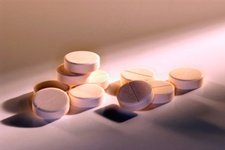 This just in: a study has found that a brand new class of diabetes medications doubles a person’s risk of pancreatitis, leading to hospitalization.
This just in: a study has found that a brand new class of diabetes medications doubles a person’s risk of pancreatitis, leading to hospitalization.
GLP-1 is the class of drugs we’re talking about and it’s used to control blood sugar levels. But, according to scientists, these drugs help form lesions in the pancreas and promote inflammation throughout the organ. You’ve seen them as the brand names “Januvia” and “Byetta.”
For years, the FDA and doctors have known that pancreatitis might be a side effect of GLP-1 therapies. But this is the first evidence that accurately gauges the risk that stems specifically from the drug and not, for instance, from other things like obesity and heavy drinking.
For millions of Americans, these drugs effectively lower blood glucose levels. But, sometimes with new drugs, it takes a while for certain side effects to materialize. So, if you take these drugs, be aware of an increased risk to your pancreas. Keep watch for symptoms such as stomach pain, nausea, and persistent vomiting. Read the drug information carefully and understand all the potential adverse effects.
The new study is based on data from more than 1,200 people with type 2 diabetes who used at least one drug to treat the disease. Compared to people with diabetes who had not taken those drugs, the people on GLP-1 drugs were twice as likely to be hospitalized within two months.
RECOMMENDED: Dandelion could kill pancreatic cancer cells.
Pancreatitis occurs when the organ suffers inflammation. It is both painful and dangerous if it goes untreated.
For diabetics, the pancreas is already part of the problem, because either it doesn’t secrete enough insulin or the body is not able to respond to the hormone. With insulin issues, sugar can’t leave the blood to transport to other cells and it starts building up.
A diabetic is already at higher risk of pancreatitis. This drug class then doubles that already-inflated risk. Not good! Let your doctor know that you’re aware of the risks of taking this drug and that you want to evaluate if those risks outweigh the benefits and whether you should stop taking this medication.
Source(s) for Today’s Article:
Singh, S., et al., “Glucagonlike Peptide 1-Based Therapies and Risk of Hospitalization for Acute Pancreatitis in Type 2 Diabetes Mellitus,” JAMA Intern Med; published online February 25, 2013.
